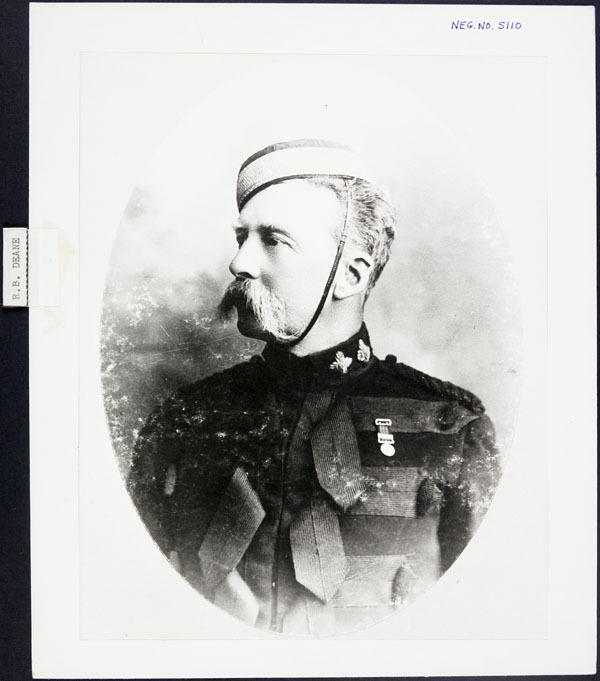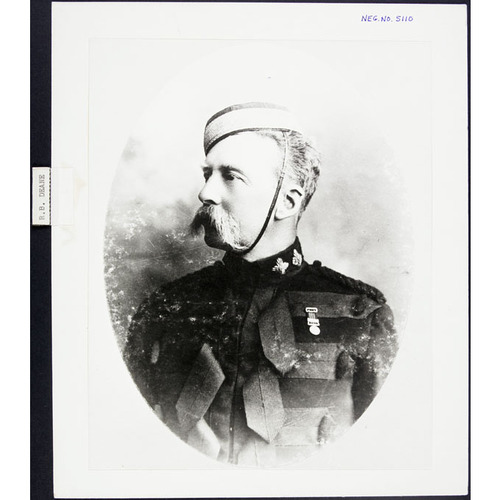DEANE, RICHARD BURTON, (R)NWMP officer and author; b. 30 April 1848 in Ootacamund, India, son of Henry Deane, a Church of England clergyman, and Aurora Cavendish Lewis; m. first 7 Nov. 1870 Martha Critchell Ridout on the Isle of Portland, England, and they had three sons and two daughters; m. secondly 22 April 1908 Mary Dennehy in Calgary; m. thirdly 19 Feb. 1917 May Thyne in London, England; d. 13 Dec. 1930 in Diano Marina, Italy.
With his drooping moustache, tall and lean frame, pale complexion, cold eyes, and acerbic tongue, R. Burton Deane was a strong, vaguely threatening presence. As a mounted policeman for 31 years, he participated in the transformation of the southern Canadian prairies from the open plains of 1883 to the populated farming country of 1914.
In many respects Deane was a typical officer. He came from a respectable but not wealthy family, had a military background, was Anglican, knew about military and criminal law, and held the values of the Anglo-Canadian elite. The core of his life’s work was in Canada, but he was not wholly Canadian, either by birth or by inclination. In a sense, his career here was that of an imperial officer, and he no doubt cherished being awarded the Imperial Service Order in 1915. For him the British empire was a living reality, not a detached abstraction. Yet even after his retirement to England his thoughts remained on his Canadian experiences, as is evidenced by his extensive writing. Indeed, next to his skin for the rest of his life he wore the scratchy standard-issue underwear of the Royal North-West Mounted Police.
At the time of Deane’s birth, his father was a chaplain for the East India Company. Although the family moved to England about 1851, the spell of India and empire on them remained strong. At the grammar school in Ipswich and within the fold of the Church of England, Deane was taught the perceptions of the gentry. He was an adequate student in academic subjects but excelled in sports, especially cricket.
In 1866, at age 18, he joined the Royal Marines as a second lieutenant, and he was promoted first lieutenant a year later. Further advance was halted by a huge reduction of manpower in the unit. Still, he served on various cruises and saw action in the 1873–74 campaign against Ashanti warriors in present-day Ghana. In 1876 the marines recognized Deane’s organizational skills by naming him adjutant of the 3,500-strong Chatham division, but promotion to captain was unavailable until 1881. By then he had a wife and five children and, if he remained merely a captain, he faced mandatory retirement in less than a decade on what he considered an inadequate pension. He therefore arranged early retirement and moved his family to Canada in 1882. Using the influence of his cousin Thomas Charles Patteson, a prominent Canadian Conservative, he secured a position as aide to Governor General Lord Lorne [Campbell*] for a few months and eventually persuaded Prime Minister Sir John A. Macdonald* to appoint him an inspector in the North-West Mounted Police as of 1 July 1883.
At the new police headquarters in Regina, Deane’s initial responsibility was to train recruits and to prepare standing orders for the force. In less than a year he was made the adjutant and was promoted to the senior rank of superintendent at the substantial yearly salary of $1,400. During the North-West rebellion of 1885, Deane was left in charge at Regina during the absence of Commissioner Acheson Gosford Irvine. After hostilities ceased, he became responsible for the prisoners, including Louis Riel*. Evidently Riel appreciated Deane’s permission to write in the commissioner’s office and even dedicated a poem to his jailer.
When Irvine was removed in 1886, Deane thought he was a candidate for the position, but Lawrence William Herchmer*, with better connections and longer service in western Canada, was named. Deane and Herchmer were able bureaucrats but abrasive and strong-willed individuals. Consequently, they clashed at every turn, and keeping both of them in Regina was impossible. Deane was replaced as adjutant, and then sent east on a recruiting trip before finally being given command of the relatively new Lethbridge (Alta) division in 1888.
Deane arrived at his new post on his 40th birthday and for the next 26 years he was the commanding officer of one of the mounted police divisions on the southern Canadian plains. For the first decade it was the Lethbridge one; from 1898 to 1902 he was the de facto supervisory superintendent for both Lethbridge and Fort Macleod; from 1902 to 1906, after falling foul of Clifford Sifton, the minister of the interior, for bringing to justice some of Sifton’s friends, he was relegated to the Maple Creek (Sask.) division; and from 1906 to 1914, following a change of minister in Ottawa, he held the choice posting of Calgary, where the house that was built for him was the best at any mounted police barracks and, as Deane House, is now a provincial historic site.
As a divisional commanding officer, Deane demonstrated a high degree of competence at the numerous tasks required. He demanded much of his men and with his sharp tongue did not hesitate to cut down anyone who failed in his duty. Yet he gave credit where due and was realistic in his expectations. Although he was frequently judgemental with regard to those who attracted the attention of the police, he was sometimes bemused and even capable of genuine sympathy for unfortunates who were simply victims of a world that overwhelmed them. He had no belief in the perfectibility of society. But while Deane was an efficient and not inconsiderate superintendent, his superiors often found him difficult to discipline, for he was supremely confident and hotly and skilfully opposed criticism.
Deane’s official reports paint a vivid picture of the pioneer prairies. Of course, the positive side of development is represented but all types of humanity appear, from incompetent judges to murdered prostitutes, from drunken brawlers to cattle rustlers, from battered women to starving aboriginals, from fanatical ministers of religion to insane destitutes. He relates everything from the most serious crimes to petty internal police squabbles including an incident in which some constables threw the bedding of an unpopular non-commissioned officer down the latrine. His accounts are more intriguing than those of other commanding officers since they are full of personal opinion, humour, sarcasm, Latin and French phrases, and irony. On one occasion, for example, his report began, “The new criminal year . . . opened gaily with an indecent assault, a robbery and a culpable homicide.”
The range of Deane’s competence and interest extended well beyond policing. He was an accomplished magician, whose performances had made him a skilled actor, director, and producer by the time he landed in Canada. He became a founding father of theatre in both Regina and Lethbridge. A fine cricketer who had played on high calibre teams in England, even against touring professionals, he continued to play, when possible, until 1897. He held senior posts in the masonic order and served as a warden and occasional lay reader for the Church of England. In addition, he was an avid gardener, a collector of recipes, and a dabbler in business schemes.
Deane had five children, two of whom predeceased his first wife, who died in 1906. He remarried in 1908, just days before his 60th birthday so that his bride would be eligible for a widow’s pension. It was not to be, for she fell ill and, although attended by Deane’s son Reginald Burton, a physician, she died in 1914.
Deane buried her, left Calgary on 30 September that year, and retired to England. In 1916 his book Mounted police life in Canada: a record of thirty-one years’ service, was published. Although flawed in organization, it remains a valuable source on the history of the force. Certainly it was no whitewash for Deane was quick to criticize personalities both outside and inside the organization. He continued his writings but in 1917 married for a third time and thereafter evidently slipped into a tranquil retirement in Somerset, living on his pension and tending his beloved roses. He died in 1930 in Italy, where he had apparently gone for his health.
Details of Richard Burton Deane’s personal and family life have been gleaned from researches in the India Office Records in the Oriental and India Office Collections of the British Library (London), the GRO, the Royal Marine records in National Arch. (G.B.), ADM, and the Suffolk Record Office, Ipswich, Eng. Materials relating to Deane in Canada include his papers in the GA (M 311, M 313, M 3933, M 6017), and at the LAC (MG 29, E48). The records of the Royal Canadian Mounted Police in LAC, RG 18 contain thousands of reports, records, and letters written by, to, or about Deane, or on matters in which he was involved. Deane’s own reports may also be found in the annual reports of the North-West Mounted Police, 1883–1903, and of the Royal North-West Mounted Police, 1904–14, printed in Can., Parl., Sessional papers.
Deane’s book, Mounted police life in Canada: a record of thirty-one years’ service (London, 1916), has been reprinted (Toronto, 1973), and one of his shorter pieces, “The story of Joe Bush,” has been edited by W. M. Baker and published in Alberta Hist. (Calgary), 40 (1992), no.4: 3–15.
W. M. Baker, “Captain R. Burton Deane and theatre on the prairies, 1883–1901,” Theatre Research in Canada (Toronto), 14 (1993): 31–59; “Superintendent Deane of the mounted police,” Alberta Hist., 41 (1993), no.4: 20–26. William Beahen, “For the sake of discipline: the strange case of Cst. Basil Nettleship – deserter,” RCMP Quarterly (Ottawa), 49 (1984), no.3: 41–45. William Beahen and S. [W.] Horrall, Red coats on the prairies: the North-West Mounted Police, 1886–1900 (Regina, 1998). S. W. Horrall, “The (Royal) North-West Mounted Police and prostitution on the Canadian prairies,” Prairie Forum (Regina), 18 (1985): 105–27. R. C. Macleod, The NWMP and law enforcement, 1873–1905 (Toronto, 1976). A.-M. Mavromichalis, “Tar and feathers: the mounted police and frontier justice,” Alberta Hist., 43 (1995), no.2: 16–24. Pioneer policing in southern Alberta: Deane of the Mounties, ed. W. M. Baker (Calgary, 1993).
Cite This Article
William M. Baker, “DEANE, RICHARD BURTON,” in Dictionary of Canadian Biography, vol. 15, University of Toronto/Université Laval, 2003–, accessed July 25, 2025, https://www.biographi.ca/en/bio/deane_richard_burton_15E.html.
The citation above shows the format for footnotes and endnotes according to the Chicago manual of style (16th edition). Information to be used in other citation formats:
| Permalink: | https://www.biographi.ca/en/bio/deane_richard_burton_15E.html |
| Author of Article: | William M. Baker |
| Title of Article: | DEANE, RICHARD BURTON |
| Publication Name: | Dictionary of Canadian Biography, vol. 15 |
| Publisher: | University of Toronto/Université Laval |
| Year of revision: | 2005 |
| Access Date: | July 25, 2025 |




